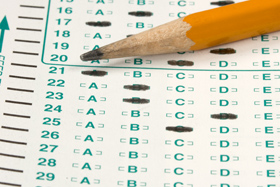Is the LSAT overrated by law school officials? Study shows need for holistic assessment, profs say

Image from Shutterstock.
Law schools give more weight to scores on the Law School Admission Test than merited by the test’s predictive powers, according to two researchers who studied the relationship between several variables and law school grades.
A six-point difference in LSAT scores could make a difference in where a student is accepted and when that student receives a scholarship, according to University of Colorado Law School professors Alexia Brunet Marks and Scott Moss. But that amount of LSAT gap predicts only a modest 0.1 difference in law school grades, they write in a paper posted at SSRN. The Wall Street Journal Law Blog covered their findings.
Marks and Moss studied the law school applications and grades of more than 1,400 students who attended Case Western Reserve University and the University of Colorado law schools. The study spanned 2005 to 2012. They examined variables such as undergraduate grades, LSAT scores, college quality, college major, work experience, criminal and academic misconduct, and extracurricular leadership.
Among their findings:
• Students with high LSAT scores and low undergraduate grades were more likely to perform worse in law school than students with low LSAT scores and high undergraduate grades. The authors caution that the results may be distorted because law schools favor LSAT scores over higher grades, admitting a greater proportion of “splitter” students with high LSATs and low grades than splitters with the opposite profile.
• Undergraduate grades significantly predict law school grades, but increases in undergraduate grades have a greater effect when the grades are at higher levels. As a result, the difference between weak and average undergraduate grades is material, but not as powerful as the difference between good and elite grades.
• The only college majors that had a positive correlation with law school grades were in the “STEM” majors of science, technology, engineering and math and the “EAF” majors of economics, accounting and finance. STEM majors were 71 percent more likely to be in the top quarter of law students, while EAF majors were 30 percent more likely to be in the top quarter.
• Work experience most correlated with good law school grades at a “sweet spot” of four to nine years of experience. Out of six categories of type of employment examined, only two were significant predictors of law school grades. Teaching experience is akin to five extra points on the LSAT. Military experience, on the other hand, is akin to a decrease of about seven LSAT points, except for those with four to nine years military experience.
• Leadership roles pursued as resumé builders aren’t a significant predictor of law school grades.
“A key overall lesson of all the above findings,” the professors write, “is the need for a broadly holistic review of all applications—because no one variable, alone, is powerful enough to justify admitting or denying a particular applicant. Thus LSAT or UGPA ‘cutoffs’ are ill-advised, even though those are two of the more powerful significant predictors” of law school grades.



